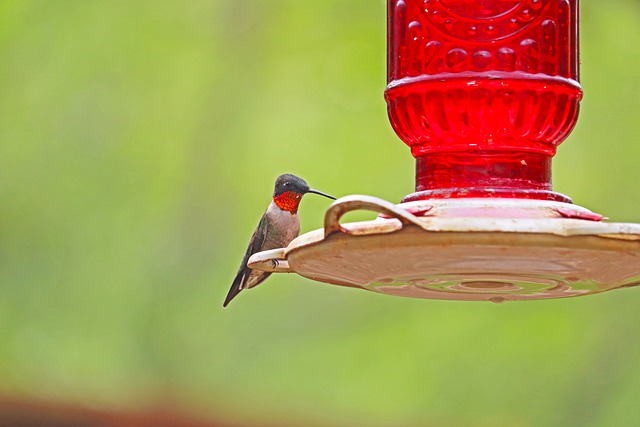Ruby-throated Hummingbirds have a basic diet with the majority of their diet consisting of small insects like fruit flies, small spiders, mosquitos, bees, gnabs and so on. Sweet nectar from bright flowers is another food source that ruby-throated hummingbirds eat and are probably what they’re most known for eating.
Juices from fruits like berries, peaches, oranges tree sap and sugar water within feeders are a few of the other edibles Ruby-throated hummers consume.
If the nectar from a flower isn’t sweet enough, Ruby-throated Hummingbirds have even been known to reject it.
What Plants Do Ruby-throated Hummingbirds Eat?

Hummingbirds love the Nectar produced from brightly coloured flowers and it’s their go to food source if sugar water within feeders aren’t available as a substitute. The flowers that hummingbirds find amongst the most desirable includes perennials such as bee balms, columbines, daylilies, and lupines; biennials such as foxgloves and hollyhocks; and many annuals, including cleomes, impatiens, and petunias.
Brightly coloured flowers and plants are the easiest to spot for hummingbirds as their sense of smell isn’t good enough to guide them to a Nectar source. Therefore colours that catch a hummingbirds eyes, which in most instances include red, pink, fuchsia, or purple, are the deciding factor on whether they’d eat the plants nectar or not.
Furthermore, tree sap is another plant based food source hummingbirds feed on as its sweetness is one that Ruby-throated hummingbirds appreciate greatly.
Are Ruby-throated Hummingbirds Herbivores?
No, ruby-throtated hummingbirds are not Herbivores. They’re more so omnivores beacause they do consume a large number of small insects along with flower nectar.
In fact insects make up around 80 percent of a hummingbirds diet whilst the sweeter delicases that they’re more known for eating, flower nectar, tree sap, juices from rippened fruits and sugar water from feeders makes up the remaining 20 percent.
The reality is that hummingbirds are insectevorous by nature. In the past people were unfamiliar with this insect eating diet of there’s but, once the stomach of a hummer was observed to mostly consist of insects, it completely flipped the script.
Modern observations by authorties like Dr. Doug Tallamy (author of Bringing Nature Home) firmly consider Ruby-throated Hummingbirds as insectevours birds that eat a bit of nectar on the side as opposed to the other way round.
Why Do Ruby-throated Hummingbirds Eat Insects?

Ruby-throated hummers mostly eat insects as they make up a core source of their nutrition. Protein from the bugs allows these mini birds to survive more easily as protein from insect meat povides more value, in terms of energy per gram, and as a whole is significantly more nutritious than a hummingbirds favourite snack, sweet old nectar.
Taking into account a ruby-throated hummingbirds rapid rate of metabolism as a result of their constant wing flapping and moving around, a more nutritious food source is a paramount accessory for their survival.
That’s why insects make up the large protion of a hummingbirds diet, whether it be in the chickling raising process or to support the energy consumption as an adult.
How Much Can A Ruby-throated Hummingbird Eat In A Day?
Relative to their weight and size these little birds consume a ton of food in a single day. More often than not a hummer consumes roughly their body weight in food within 24 hours.
Considering they tend to weigh a minuscule 4 grams on average, consuming ‘only’ 4 grams isn’t much at all however, if we convert this to human number, eating 70 – 80kg in nectar, and various insects everyday would be absolutley ludicrous for the average Joe without dying from overeating
Competitive eaters like Joey Chestnut can eat a lot for our standards, comsuming upwards of 3 – 5kg when competing and possibly up to 10kg if he decided to eat a lot for the entire day but, compared to his roughly 100kg+ bodyweight, his eating habits can’t even hold a candle to the average ruby-throated hummingbird.
Their physiology plays a major role in their eating habits, high metabolism and a rapid heartbeat equals more energy needed to survive after all so, it’s not all that surprising tiny birds like the Ruby-throated Hummingbird eat as much as they do.
How Often Does A Ruby-throated Hummingbird Need To Eat?
Ruby-throated hummers need to eat every 10 -15 minutes. They feast on roughly 1000-2000 flowers daily whilst insect consumption can range in the hundreds all the way up to thousands too.
Of course the size and availablty of an insect food source can reduce the consumption to only a few dozen or less nevertheless, this simply shows off how crazy a hummingbirds daily eating life can be.
A crazy fast metabolism and a whole lot of food gathering isn’t just a walk in the park for these guys, it’s a constant, a lifestyle choice they have to commit simply to survive.
There are obvious exceptions to these rules such as when they’re in a tropor state (hibernating so to speak) or when looking after their eggs and babies but, in general as ruby-throated hummingbirds move around a lot, the caloric needs to macth their activity isn’t a small matter at all
Without food it’s quite possible for a hummingbird to even die of starvation within 3 – 5 hours.
Summary
A Ruby-throated hummingbirds diet is quite diverse as they consume a lot of smaller insects, flower nectar, tree sap, the juices from rippened fruits and sugar water are generally what they like to chow down on. Furthemore, they can be a little picky if the flower nectar doesn’t meet their sweetness criteria.
Being insectevorous and a huge fan of sweets is definetly different and to some degree does seprate their tastebuds from a large number of other birds.
If I were to describe hummingbirds eating patterns in the simplest of ways I’d say that they love insect meat topped with a very healthy offering of sweet sweet nectar on the side.
References
https://www.google.com/amp/s/www.almanac.com/content/plants-attract-hummingbirds?amp
https://choosenatives.org/articles/how-to-feed-hummingbird-part-i-insects-protein/#:~:text=Tallamy, view hummingbirds as insectivorous,and spiders,” Tallamy explains.
https://www.thespruce.com/feeding-hummingbird-insects-385954#:~:text=Insects Hummingbirds Eat,an individual bird’s dietary needs.
Amhil Khan, a dedicated nature enthusiast and the founder of BirdsOfTheWild.com, is a passionate advocate for the captivating world of avian wonders. With a deep-seated curiosity about the intricate lives of birds, Amhil’s journey began as a fascination and has evolved into a mission to inspire others to appreciate and protect these magnificent creatures.
Amhil’s love for birds led to the creation of Birds of the Wild, a platform where his expertise in ornithology, coupled with his captivating storytelling, provides readers with an immersive and educational experience. Through his lens and words, he captures the essence of birds in their natural habitats, offering a glimpse into their behaviors, migrations, and the ecosystems they inhabit.

